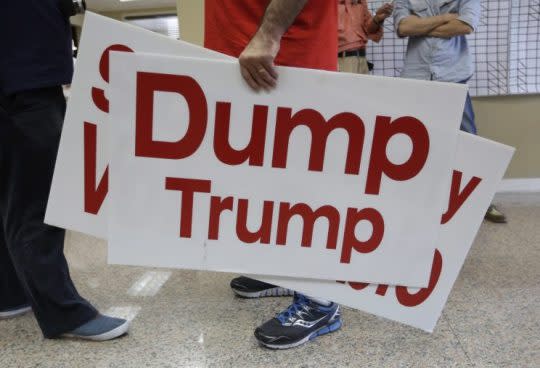Another GOP stop-Trump effort says it is quietly picking up steam

The Rules Committee is not the only stop-Trump game in Cleveland.
Talk of efforts to dump Donald Trump at the Republican National Convention this month have focused on whether the key committee’s 112 members would support a measure to allow delegates to vote for whomever they want, instead of being bound to their state’s primary or caucus results.
If the Rules Committee passes that resolution, then the full convention would have to vote on the matter.
But while anti-Trump delegates based in Colorado and New Jersey spend their time on that path, another group of convention delegates based in Wisconsin is organizing to stop Trump on the floor of the convention — regardless of what happens to that Rules Committee resolution.
“I personally believe there are enough delegates who will abstain to keep Trump from getting the nomination on the first ballot, and I think that will open up a lot of options for the delegates,” said Dane Waters, an official with Delegates Unbound, a group formed this year.
The group is led by Eric O’Keefe, a respected Wisconsin political activist in the state who worked aggressively to bolster Gov. Scott Walker during the 2012 attempt to recall him.
Top RNC officials have dismissed the delegate-led efforts to stop Trump. RNC spokesman Sean Spicer in June called it “nothing more than a media creation and a series of tweets.”
But O’Keefe and Waters’ group is reportedly well organized, even more so than the publicized efforts focused on the Rules Committee. If enough delegates abstain on the first ballot — or vote for another candidate — so that Trump does not get at least 1,237 votes out of the 2,472 delegates on the floor, the convention would have to hold a second round of voting.
At that point, other Republican politicians would be emboldened to put themselves forward as alternatives to Trump, delegates would be more free under the rules to vote for a wider range of options and all hell would break loose on the floor of Quicken Loans Arena as the convention became open and contested.
Waters told Yahoo News on Thursday that they have people in many states working to force the convention into multiple ballots.
“Delegates have the right to object and challenge the authenticity of their state’s announcement of votes cast for the possible nominee,” Waters said. “There are a significant number of states where delegates have made clear their intent to challenge the number of votes announced if they have been stopped from exercising their right to vote their conscience.”
Trump supporters on the Rules Committee will likely try to pass a resolution officially binding the delegates to the results of their states’ primaries and caucuses, as was done in 1976, said A.J. Spiker, a former chairman of the Iowa Republican Party who is working with Delegates Unbound.
But Spiker told Yahoo News he did not think Trump supporters could get 56 votes on the Rules Committee for such a resolution.
And a whip count of the delegates conducted this week by a pro-Trump member of the Republican National Committee found large numbers in favor of allowing an open vote, and many hundreds more up for grabs.
Randy Evans, an RNC member from Georgia, estimated that 890 delegates are “personally loyal” to Trump, another 680 oppose the presumptive Republican nominee and about 900 are undecided or undeclared, according to a Wall Street Journal report.
Waters said that the number of delegates joining his cause has continued to grow of late, and that because delegates are seeking his group out, the anti-Trump forces have been able to work past the fact that the RNC never provided a list of delegates from each state.
“Typically, you’re having to go out and convince supporters to follow you,” Waters said. “The difference here is it’s not requiring much of an effort to get people to sign up.”
Trump’s own stumbles over the past week have not helped his cause with delegates, even as presumptive Democratic nominee Hillary Clinton has simultaneously been embroiled in controversy. FBI Director James Comey said on Tuesday that he would not recommend charges against Clinton for her use of private email servers for official State Department business, but said Clinton had made a serious error in judgment.
But at Wednesday campaign rally in Cincinnati, Trump went on a lengthy tangent in which he drew attention to his campaign’s use of a six-pointed star in a tweet criticizing Clinton with a photo of her next to a pile of money and the star, which is a symbol of Judaism. Trump’s image, reportedly taken from white supremacist corners of the Internet, was widely denounced as anti-Semitic. Trump has since repeatedly defended the tweet as innocent.
And on Thursday, Trump clashed with Republican senators during a closed-door meeting on Capitol Hill. Sen. Jeff Flake of Arizona stood to confront Trump over his verbal attacks on racial and religious minorities, and on Sen. John McCain. Trump took umbrage at this and told Flake he would lose his seat this fall, according to the Washington Post.
However, U.S. senators serve six-year terms, unlike members of the House — who are up for reelection every two years — and Flake is not up for reelection this fall. He reportedly informed Trump of this fact.


